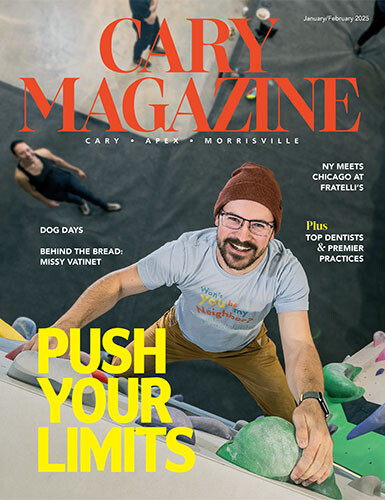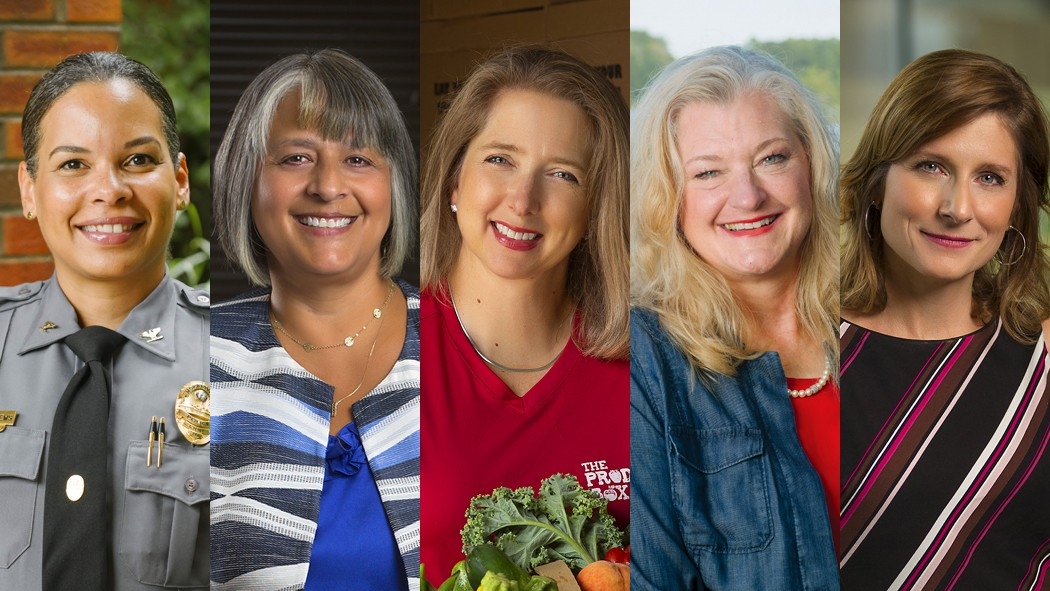The Women of Western Wake is Cary Magazine’s signature feature that each year introduces you to a handful of women who embody our own aspirations.
Here, our honorees share their stories and advice on taking risks, finding rewards, and working hard to better our world.
Patrice Andrews
Morrisville Chief of Police
Written by Bridgette A. Lacy, Photographed by Liz Condo
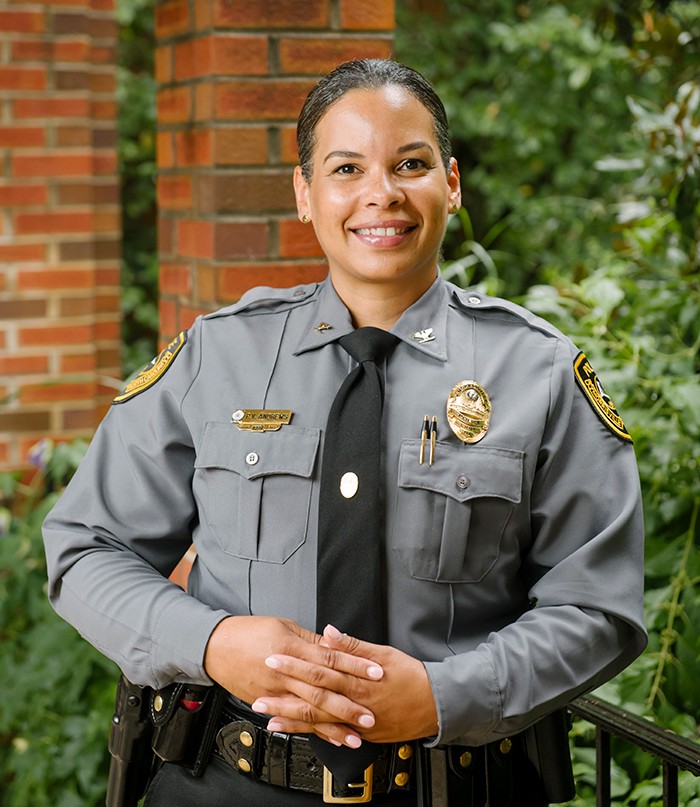
Patrice Andrews, Morrisville’s chief of police, communicates regularly with young people in the community over social media, through blog posts and in monthly meetings. It’s a way to show that children are valued and their opinions are important, she says.
Patrice Andrews’ initial instinct was to protect and provide for her daughter. She was a single mother searching for a job with a salary, benefits and health insurance. She opened the newspaper and saw the Durham Police Department was accepting applicants.
“I needed something more stable for my 6-month-old daughter,” she said.
Andrews, 44, rose from uniform patrol on the streets of the Bull City to Morrisville’s top law enforcement officer. In lots of ways, mothering informs a lot of the chief’s leadership.
As a former commander with the Durham Police Department’s criminal investigations division, she went to the scenes of a lot of homicides. She had an epiphany.
“I valued life a lot more than the people who committed these crimes. I was tired of the diminishing of a person’s life. I wanted to fix it as a mom. It seemed like every homicide we went to, there was a black- or brown-face man killed by the hands of another black- or brown-face man.”
Andrews believes the problem was, too often, children being written off when they didn’t conform to what is normal.
“There’s a lack of investing in our children,” she said. “There’s a lack of access to basic needs including quality education, grocery stores, health care and resources to address trauma. When we see a child acting out, we medicate.
“Too many children are devalued, and they believe it.”
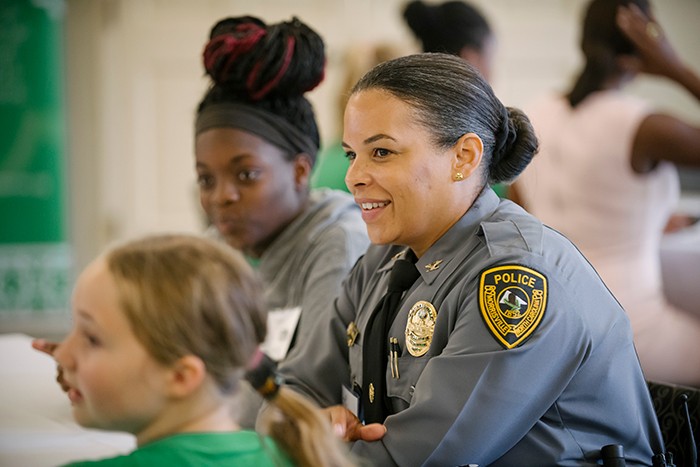
Patrice Andrews meets with middle-schoolers participating in the Girl Scouts Summer Leadership Camp. For one of the camp activities, the girls discussed leadership with professional women at a town hall meeting held at Meredith College in Raleigh.
Andrews, the mother of four, has opened up a line of communication with Morrisville’s children using Flipgrid, a discussion platform. She learned about Flipgrid when her son was using it to complete a school assignment.
Bullying, school shootings, body image and favorite things to do are common topics for Andrews and the middle- and high-schoolers. She and her police officers blog on the various issues, and students can offer their solutions.
“We wanted to hear the kids out,” Andrews said, adding that parents often email her to reach out to their children.
The Morrisville community is a small, diverse one. Morrisville’s 24,000 population racial makeup is about 54 percent white, 12.9 percent African-American and 27.2 percent Asian with smaller percentages as Native American or Hispanic.
Another way Andrews keeps an ongoing conversation with the community is through the Barbershop and Beauty Shop Rap Sessions. It’s a partnership with the Cary Police Department and Tru Pettigrew, the founder of Tru Access, an organization dedicated to community bridge-building.
“You can’t build trust in tragedy,” Andrews said.
Community members and officers meet at the barbershop once a month to discuss issues ranging from law enforcement relationships to racial bias.
“It is important to meet people where they are, using the communication tools and channels of their choice,” said Morrisville Mayor TJ Cawley. “Chief Andrews has embraced new technology including Flipgrid, Facebook Live and Twitter, to share information and build trust with our citizens. We are fortunate to have her leading our police department.”
Andrews was hired by the Morrisville Police Department in April 2016. She supervises about 35 people. The Chapel Hill native initially thought she wanted to study Marine Biology and attended Hampton University in Virginia for a year. She then enrolled at North Carolina Central University and was expelled.
“I fell in love, and class became optional for me,” said Andrews, reflecting on her younger self. “I met the father of my children and first husband, stayed underneath him, and lost myself by my own choosing.
“You can reinvent.”
Her life changed in September 1996 when she started training in the Durham Police Academy. She still gets excited when she recalls the position offered a salary of $23,472.
The academic and physical training was rigorous. The former high school cheerleader found the physical portion came easier to her than the books. But her real education came once she started patrolling the streets.
“It was like drinking from a fire hose; you couldn’t take it all in,” Andrews said. “My parents sheltered me from a lot of the world’s things. Many of these experiences I was having for the first time. That’s when I realized I wanted to be a drug officer. Drugs are so deeply rooted in our community.”
Andrews worked in special operations from 2000 to 2005 dealing with drugs and prostitution. In 2005, she was promoted to corporal. In 2007, Andrews returned to NCCU and graduated cum laude with a bachelor’s in criminal justice in 2012.
Andrews served in various departments in the Durham Police Department, learning lessons she reflects on even now.
“You help them, and then you have to move on,” she said of assisting citizens. “Ironically, that’s even truer today. You have less time in which to do all you need. You have officers who want to see that call through, but they are answering so many calls per day or night.”
When she’s not working 10-hour days, the chief enjoys sitting on her front porch, talking to neighbors and spending time with her blended family. Her husband is a retired Durham motorcycle cop, and between them, they have two daughters and two sons. — Kennedy, 22, Brianna, 17, Christian, 13, and Wyatt, 11.
“You mold your agency by what’s in your heart,” she said.
Cathy Moore
Wake County Public Schools Superintendent
Written by Amber Keister, Photographed by Jonathan Fredin
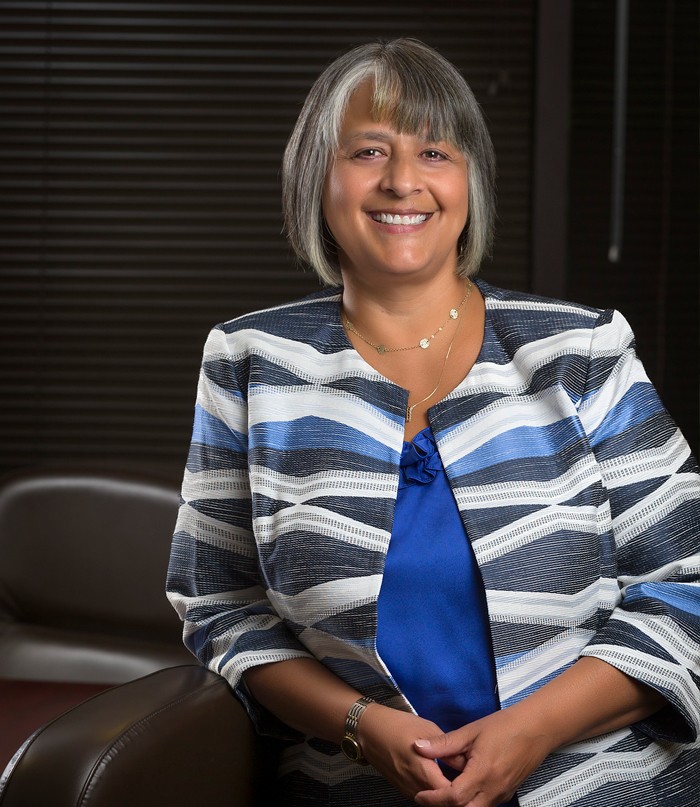
Cathy Moore, the superintendent of the Wake County Public School System, says it’s vital that parents, businesses and organizations work together to find innovative solutions for the challenges ahead. “How we encourage, promote, and ensure family engagement and community engagement are going to be big rocks moving forward.”
For Cathy Moore, superintendent of the largest school system in North Carolina, it’s all about making the big feel small. In Wake County, a district with more than 160,000 students and 19,000 employees, Moore approaches the work with a simple mantra: every child, each day.
“(Students) don’t care how much you know, until they know how much you care,” she said. “If you don’t first establish a relationship, a place of trust or a mutual understanding, you’re missing ingredients for the best learning environment.”
This dedication to students was cited by the Wake County Board of Education when it named Moore as its new school superintendent in May. With the appointment, Moore became the first permanent female and first Hispanic to lead the district, which is also the 15th largest in the nation.
“It’s hard for me to think about it, because it is a big deal, and yet the work is the work” she said.
Her 30-year career and deep experience in Wake County were also important to a community looking for stability. The last three superintendents each served fewer than five years in the role.
In 1988, Moore was hired to teach French at Enloe High School. She eventually became the assistant principal there, and then moved to Sanderson High School to become principal. She was named Wake County Principal of the Year for 2007-08, and she was a finalist for N.C. Principal of the Year in 2008.
Moore attributes her success at Sanderson to knowing her students, their names and their stories. Connecting with the teenagers enabled her to navigate challenges and triumphs — up to and including graduation.
“As principal, it’s important to know every kid who is crossing that stage, and also to know who is not crossing that stage,” she said.
Getting to know the roughly 2,000 students at Sanderson was no easy task, but Moore is used to hard work.
“That whole American dream work ethic is very much embedded in who I am,” she said. “I’ve been taught and nurtured to see possibility and to hope. I want that for every child in the Wake County Public School System.”
When Moore was 2 years old, her mother and stepfather brought her and her older sister to the United States from Ecuador. The children grew up with the notion of doing one’s best at all times — because it was the right thing to do and because it was a way to give back to the country that had given them so many opportunities.
“She is the epitome of strength, courage and fearlessness,” Moore said of her 87-year-old mother. “She sold everything she had, turned over every rock she needed to, to bring us to this country, with our green cards and everything, because she wanted to do it right.”
Although her mother only had an elementary-level education, she made sure school was a priority for her children. Moore knew from an early age that a good education opens doors.
“In the community today, (there are) families who are passionate, and who have a will around education being important for their children, but may not have the ability to navigate it,” she said. “That’s where we’ve got to be responsive.”
Language and cultural barriers can prevent families from being involved in their child’s school, and one of Moore’s priorities is to encourage and promote family and community engagement. As an immigrant herself, she has a deep empathy for newcomers.
“I believe my personal story and background allow me an understanding on a personal level of both the struggles and the aspirations of families that come to Wake County,” she said.
All those families coming to the area, whether from another state or another country, bring roughly 2,000 new students to Wake County every year. That growth is the school system’s — and Moore’s — biggest challenge.
Finding space for all those students can mean crowded schools, temporary classrooms and overburdened services. Building new schools in high-growth areas like Western Wake, is becoming difficult as large tracts of land appropriate for traditional school campuses become scarce. Then there are costs for staffing, equipment, transportation and more.
“Recently, the county commissioners provided the school system with the largest per year dollar increase that they’ve ever had, and yet it fell far short of what the need was just to stay in place,” said Moore. “That’s a conundrum.”
Innovative solutions and non-traditional schools can help solve that puzzle. Crossroads Flex is a high school that merges online and in-class learning. Wake Early College of Health Sciences, which enables high school students to earn an associate’s degree from Wake Tech, is a partnership between the community college, the public schools and WakeMed.
As Moore faces these challenges and others in the years ahead, she will need the support of the community she knows well. She and her husband Tommy, a fellow educator who is now retired, raised two daughters in the Wake County schools and have deep roots here.
“It’s great to go places and know people,” she said. “People who I’ve worked with, people whose children I’ve taught, people who’ve worked with my husband. There’re so many connections. All that is gratifying, and it provides good foundation to move forward with common purpose and vision for what’s best for the school district and for the community.”
Courtney Tellefsen
Owner and Founder, The Produce Box
Written by Alexandra Blazevich, Photographed by Jonathan Fredin
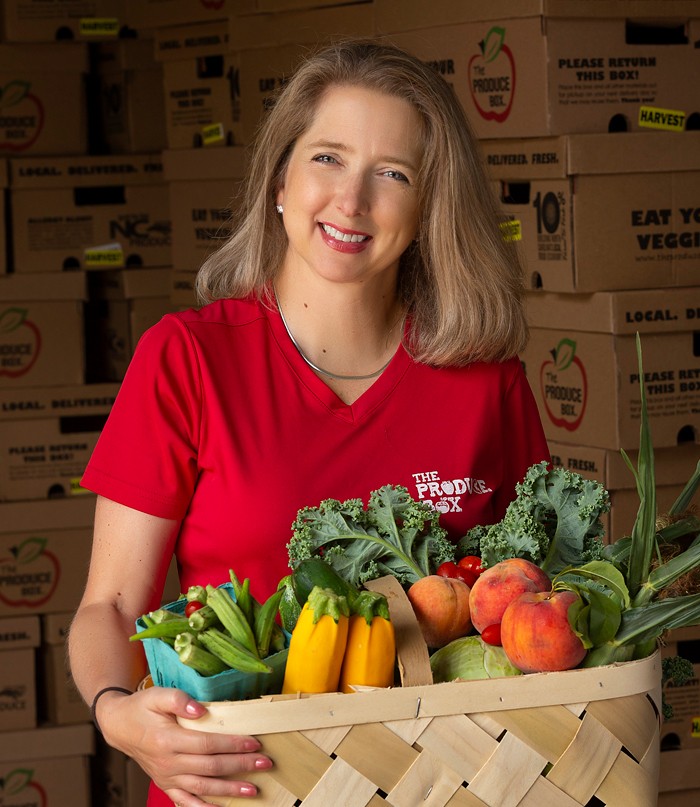
Courtney Tellefsen serves her customers with a smile. Her company, The Produce Box, delivers fresh ingredients and meals from farm to your front door.
Not many CEOs can name every employee in their company, but Courtney Tellefsen knows them all. She knows their name, their families, their joys – and they know hers as well.
Garth Johnson, a warehouse employee at Produce Box, asks how she’s doing. After a five-minute conversation between the two, he tells Tellefsen her persona never changes – she’s witty, fun and hardworking.
Tellefsen is the founder of The Produce Box, a fruit and vegetable delivery service that brings fresh food from farm to front door.
She wanted quality produce for her family, and she cared where it came from, but she didn’t have time to go to the farmers market each week.
In 2008, she sent an email to her local network asking if anyone would be interested in having farm-fresh ingredients delivered directly to their homes. Two weeks and a lot of positive replies later, Tellefsen put her idea into action. The Produce Box was born.
“It was the question of the chicken or the egg,” she said. “Is it better to already have your plan in place and then figure out if people want it? Or do you figure out if people want it and then have your plan in place?”
She gave herself a two-week deadline to start the company. It was a challenge, but Tellefsen doesn’t have any regrets.
“Sometimes when you’re under the gun like that and you put pressure on yourself, that’s when you are the most creative, and you’re the most hungry for a solution,” she said.
Instead of going to the grocery store or farmers market, customers pick out a box of produce online. The contents vary depending on season and availability, but everything comes directly from farmers and small producers. Clients also have the option of buying community boxes which are delivered to fire fighters, teachers and police officers.
Tellefsen’s idea to bring farm-fresh food directly to consumers helps local farmers sell more produce and enables families to eat healthier. She has grown her business from a few dozen of her Raleigh neighbors to 11,000 customers across the state. Roughly 275 neighborhood coordinators deliver the boxes.
But, her idea didn’t end there. As the years went on and customer surveys came back, Tellefsen introduced regional produce in the boxes. Later on, the company added boxes containing the ingredients to cook a full meal from scratch. Recently, The Produce Box partnered with Supper Meals to provide meals for those who don’t have time to wash, chop and cook a meal. Instead, a heat-and-eat dinner shows up at your door.
Tellefsen got her start in the business world shortly after her Cary High School graduation, working for Raleigh real-estate developer John Kane. As membership director and then the director of marketing at several exercise clubs Kane owned at the time, she learned the business model of enrollment fees and subscriptions. She incorporated both ideas into The Produce Box’s business model.
Her average day is spent running a company, meeting with vendors, taking her son to get his driver’s license and finding time to spend with her family and friends. As a busy woman, Tellefsen is thankful to find balance.
“If everybody is coming to you for stuff, then you need to figure out why they are coming to you,” she said. “Is it because they didn’t know what to do? Why don’t they know what to do? You need to train them. Did they know what to do but it was easier to come to you? Well, there’s a solution for that.”
Her business coach is helping her learn to delegate tasks to other employees so she can concentrate on her own daily objectives.
“It’s easy to be the go-to person for everything, but that is not the definition of balance,” she said. “Balance is not you handling everything.”
She does her best to serve her community partners as well as her customers — all while paying her employees and providing a happy and healthy work environment. But sometimes that means breaking the traditional rules of business.
“How do you sell as much local produce as possible, and continue to support community partners, and pay farmers a living wage, and pay your employees a living wage, and give customers the lowest price possible, and see the value of their purchases?” she asked. “Some of those oppose each other.”
Tellefsen said she must give herself permission to drop the ball on her family when work is too much. Sometimes she has to drop the ball on work when family is too much.
If her kids tell her she’s bringing work home with her a lot, she knows it’s probably time to spend more time with family. If her employees aren’t sure of what they are doing, she knows it’s time for her to spend more time at the office.
“Being an entrepreneur means not necessarily having rules,” she said. “And even if you make your own rules, it means being willing to not follow them sometimes.”
Ashley Thomas
Founder and Executive Director, Bridge II Sports
Written by Amber Keister, Photographed by Liz Condo
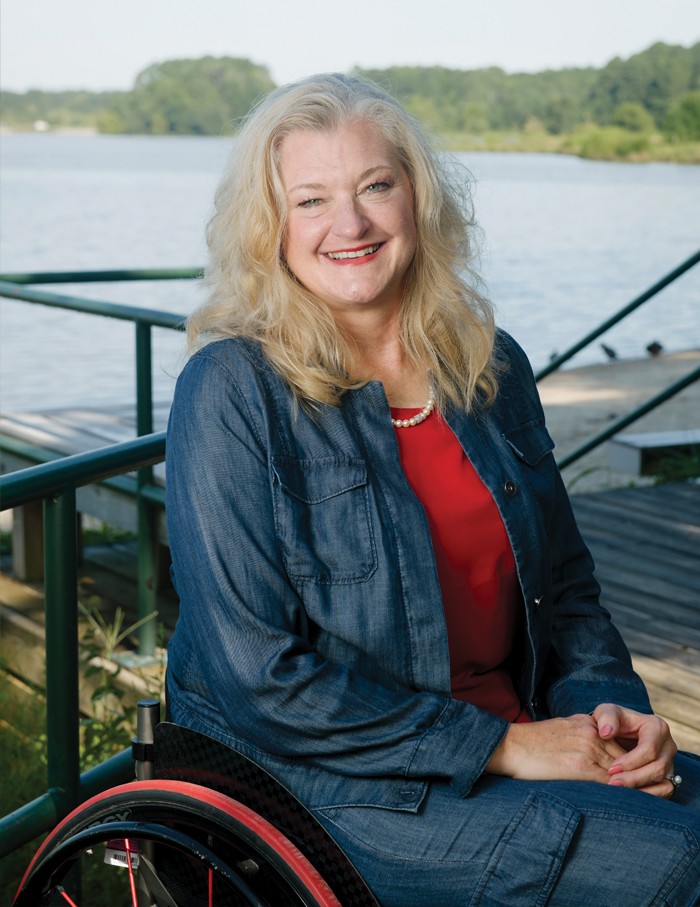
Ashley Thomas of Bridge II Sports, which promotes adaptive sports for those with disabilities, says she is grateful every time she kayaks on Morrisville’s Lake Crabtree. “It is a place for me personally that restores my heart and my soul.”
Don’t ever tell Ashley Thomas that she can’t do something.
Thomas, 56, is a tireless advocate for people with disabilities, fighting expectations that physical limitations somehow diminish a person’s worth. The nonprofit she founded, Bridge II Sports, promotes wheelchair basketball and other adaptive sports in the Triangle. Through the nonprofit, athletes of all abilities can discover the joy of competition and physical exercise.
“Everyone has value. Everyone who is born on this earth has value, whether you have a disability or not,” she said.
Thomas was born with spina bifida and uses a wheelchair. She is also an accomplished athlete.
In her 40s, Thomas participated in her first 5K and started working with a trainer at the YMCA. Exercise gave her something she had been missing all her life, she says, helping her feel better physically and mentally.
Around the same time, Thomas was volunteering at the Duke Children’s Hospital and the spina bifida clinic. She met families whose children had a variety of disabilities and scant hope for the future, she says.
“I had such joy in it. I thought kids need to have this. Boy, if I’d had this when I was a kid, how great would that have been,” she said, talking about adaptive sports.
“People need opportunity, and that wasn’t happening.”
She decided to change that, launching Bridge II Sports in 2007. Working with area parks and recreation departments, the nonprofit creates programming and brings in the specialized equipment needed to field teams. Some of the sports offered include wheelchair basketball in Raleigh, archery in Durham and bocce ball in Cary.
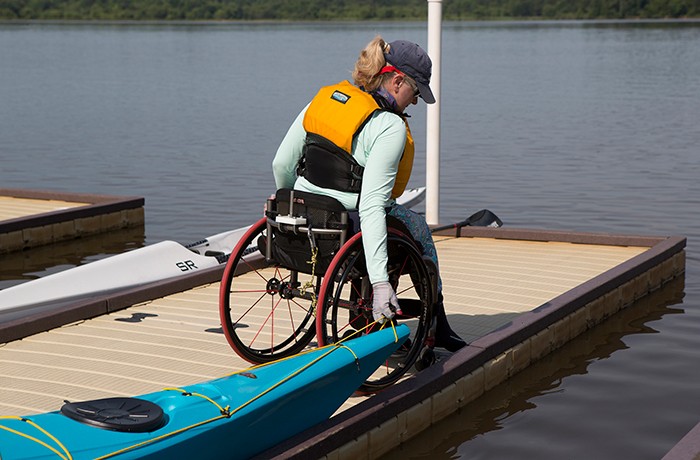
Ashley Thomas, who competed on the U.S. Paralympic kayaking team, lowers her craft to the water at Lake Crabtree. She worked with engineering students at Duke University and UNC-Chapel Hill to modify her chair so it could tow the kayak, enabling her to get on the water without help.
BIIS also coordinates the Valor Games Southeast, a three-day competition for injured veterans, in partnership with the Department of Veterans Affairs. The 2018 event drew 115 participants who competed in 11 adaptive sports throughout the Triangle.
The group also partnered with Wake County to create a wheelchair-accessible kayak launch at Lake Crabtree County Park in Morrisville. Thomas calls the project one of her proudest accomplishments.
In 2009, Thomas was introduced to kayaking at a sports conference, and soon after, she was invited to train for the U.S. Paralympic kayak team.
“I’m competitive, but never had the ability because I didn’t know about adaptive sports growing up. It was an honor at my age to be able to (compete),” she said.
As a competitive athlete, Thomas needed somewhere to train. The obvious choice was the calm water at Lake Crabtree, where motorized watercraft are prohibited, but getting from her wheelchair to her kayak was a challenge. The park needed accessible facilities and a new dock.
“In the world of disability, a lot of people demand and feel entitled, but my approach has always been if I need something, I’m going to come to the table as an active player,” she said.
“If people have a need, and you value the gift, you’ve also got to roll up your sleeves and get involved.”
Thomas and a group of fellow kayakers attended monthly meetings for nearly five years. They consulted with engineers and designers on modifications that would make the dock the most accessible in the country. She convinced officials at MetLife and Duke Energy to provide funding for the dock and other specialized equipment.
And at one point in the process, when negotiations stalled over bathroom facilities, Thomas filed a complaint with the Department of Justice under the Americans with Disabilities Act.
The dock opened in 2016 and now allows people with disabilities to station a canoe or other watercraft securely as they move from the dock into the boat. Although she doesn’t race anymore, Thomas regularly visits Lake Crabtree with her kayak.
“I don’t get out on this water – ever—and not feel such gratitude,” said Thomas. “When you’ve been in a project for five years, there are times when you say, ‘I am so over this project now.’ But when I come out here on the water, it’s so worth it.”
She appreciates everyone who worked with her and her team over the years, but those who know her attribute her success to her energy and personal charisma.
“There’s just some effect that her presence has,” said Brad Rosell, the marketing manager for BIIS.
“She makes it come together,” he said. “She has this passion for creating equal opportunities for people with disabilities. And knowing about the issues in her own life, I think that’s where it comes from. She feels it, and it comes out in just about everything she does.”
Thomas learned early on that she had to speak up for herself, to take charge of her health and to ask for help when she needed it. She says she is fortunate because some people with disabilities don’t know how to ask for help.
Through adaptive sports, Thomas aims to give players the confidence to find solutions to their everyday challenges. And through her advocacy, she wants to help the community think of people with disabilities differently.
“The world isn’t perfect; it will never be,” said Thomas. “But are we moving in the right direction? Yes, we are. And certainly on the disabilities side in the Triangle, we are, and I’m really proud of that.”
Anita Watkins
Director of Strategic Innovation, Rex Health Ventures
Written by Jennifer Buehrle Williams, Photographed by Jonathan Fredin
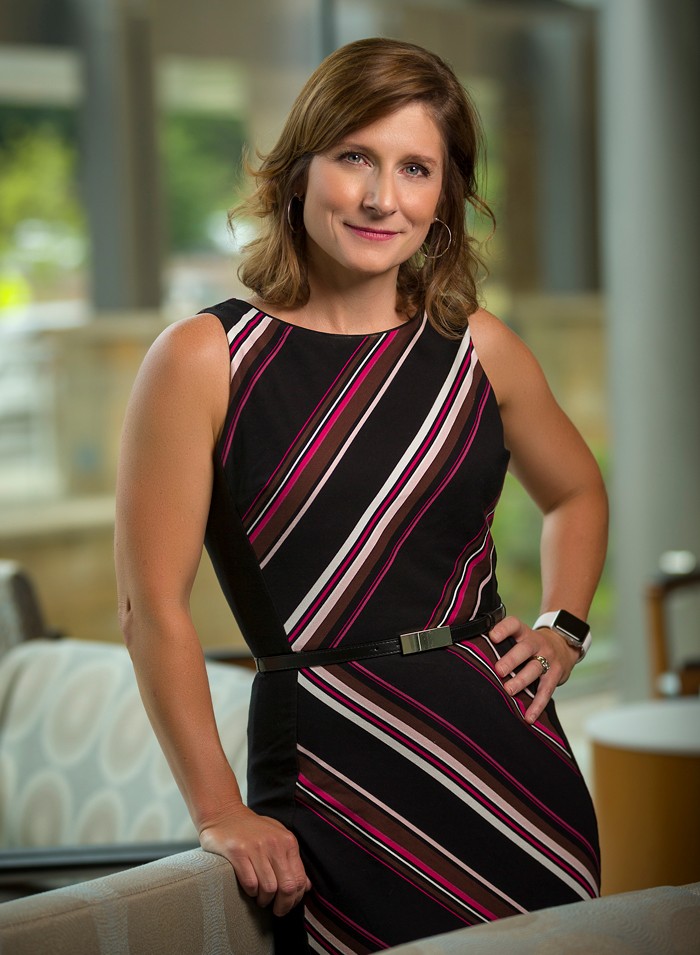
Anita Watkins of Rex Health Ventures, which invests in cutting-edge healthcare companies, says she has always looked for creative solutions and better ways of doing things. “I am a perpetual student. I’m getting to help solve difficult challenges by bringing innovative companies to Rex to partner,” she says.
For a woman who lives her life without a roadmap, Anita Watkins has covered a lot of ground. And she is only at the midpoint of an already impressive career.
The 46-year-old Raleigh native currently serves as the Director of Strategic Innovation at Rex Health Ventures. The hospital-based venture fund, which is part of the larger UNC Healthcare System, invests in cutting-edge healthcare companies that are in the early stages of development. As a strategic partner, Rex Health Ventures taps into the expertise of its hospital leaders and clinicians to help companies develop innovative products with real-world applications.
In the last six years, Watkins has considered 700 companies, gone through deep due diligence on more than 100 and led Rex to invest in 12 startups. Of those, three companies have been acquired, bringing a good return on investment to the fund and cementing Watkins’ reputation as a leader in the rapidly growing world of hospital-based venture funds.
“I didn’t see this in my future, but I love what I’m doing,” said Watkins. “Healthcare is fascinating. Venture investing is fascinating. It is truly transformative work.”
Whether it is through partnerships with Durham-based Baebies on their developing technology to screen for lysosomal disorders like PANDAS syndrome, a San Francisco startup working to reduce the number of maternal deaths by quantifying blood loss during delivery, or the Triangle semiconductor company Phononic on the first compressor-free medical refrigerators, Watkins is always on the cusp of innovative technology and always learning.
“I am a perpetual student. I’m getting to help solve difficult challenges by bringing innovative companies to Rex to partner,” explained Watkins. “Ultimately, we are impacting patients’ lives and improving healthcare. For me to be able to play a tiny part in improving the health of the community is incredible.”
Rebellious and curious
Watkins penchant for innovative problem-solving took root when she was a child. Her inquisitive nature was sometimes viewed as rebellious.
“Let’s just say, I liked to question the status quo,” she said with a laugh. “I was always asking, ‘Should I do things the way they have always been done… or is there another way?’”
That probing spirit served her well at UNC Law School and beyond. Watkins’ career has spanned state government (North Carolina Department of Environment and Natural Resources), local government (North Carolina League of Municipalities), higher education (The UNC System) and now healthcare. Each step of the way, there were problems to solve.
“I’ve been blessed to work on issues that impact a lot of what happens in this state,” she said.
Watkins considers the 17-campus UNC System the most important thing North Carolina has ever done. The impact of her work as Vice President of Government Relations during especially challenging budgetary years post-2008 can still be felt today.
Former UNC System President Tom Ross recalls Watkins as being key in representing the state’s universities during those tough years.
“Our role was to preserve as much as possible for the university system, and Anita was able to come up with creative ideas with the legislature that both sides could agree on,” recalled Ross. “When you have someone who is smart, who has great instincts and people skills, and is able to take risks, that shows a real entrepreneurial side. One of her real strengths is that she is a problem-solver who can come up with innovative solutions.”
Innovation and value
That word, innovation, has become part of Watkins’ calling card, and she carries it with her beyond the office walls. Her volunteer work in the community includes serving on the board of Innovate Raleigh, which has helped make the Capital City a top five innovation hub nationwide. She also brings her strategic focus and desire to support an ecosystem of innovation as a board member for the Council of Entrepreneurial Development and as the President of Friends of the N.C. Museum of Natural Sciences.
“I need to be able to look back at the end of the day, the week, the year and say I made an impact; I added value; I helped make things better,” said Watkins. “I think most people are wired that way. I’ve just been really fortunate to be in positions where I can have that impact.”
Closer to home, her hope is that she can also impact her two young boys and other young women who may be creative problem-solvers like she was. That they might see her work and know that women and men can do anything they want to do. That there are no barriers, and the stereotypes of the past are no longer relevant.
Meanwhile, Watkins will remain optimistic, inquisitive, and open to mapping new territory when opportunities present themselves. After all, there are a lot of questions left to ask, a lot of problems to solve and a lot of lives to impact.
